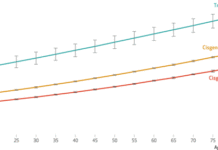
Researchers sometimes refer to the allostatic load, the cumulative toll that chronic stress takes on the brain and body, said Scott Bertani, the director of advocacy at HealthHIV, a nonprofit focused on advancing prevention and care for people at risk for H.I.V. “It only stands to reason that our bodies respond to these really complex and challenging life events and demands,” he said. For instance, he added, the act of coming out, and in some cases, coming out repeatedly, often comes with severe stress.
To cope with the constant threat of discrimination or harassment, many in the L.G.B.T.Q. community self-medicate with drugs like tobacco and alcohol, said Dr. Streed, who is also a researcher at the Center for Transgender Medicine and Surgery at Boston Medical Center. These industries have targeted the L.G.B.T.Q. community through advertising, he said, especially during Pride month. The Centers for Disease Control and Prevention report that around 25 percent of lesbian, gay or bisexual adults used a commercial tobacco product in 2020, compared with 18.8 percent of heterosexual adults, a disparity the agency partially attributes to the tobacco industry’s long history of aggressive marketing campaigns.
Research has also identified a link between sleep and heart health, Dr. Caceres said. Mounting evidence shows that L.G.B.T.Q. adults experience more sleep issues and interruptions than the general population, which may also be tied to chronic stress.
Obstacles to seeking care
A 2017 survey of nearly 500 L.G.B.T.Q. adults by researchers at Harvard T.H. Chan School of Public Health and the Robert Wood Johnson Foundation found that more than one in six reported avoiding health care because they worried about discrimination. That hesitancy means that L.G.B.T.Q. adults are less likely to access potentially lifesaving preventive health care, said Dr. Michos. All adults should be screened at least once a year for cardiovascular risk factors, which is typically part of an annual physical, she said.
Finding medical providers that you feel comfortable and safe around can be key in preventing heart disease, experts said. Dr. Streed recommends that L.G.B.T.Q. adults seek out supportive medical practitioners. The Gay and Lesbian Medical Association offers a directory on its website that allows patients to find health professionals. The Human Rights Campaign creates an annual Healthcare Equality Index — a list of health care facilities that say they are inclusive of L.G.B.T.Q. patients.
What L.G.B.T.Q. adults should know about improving heart health
While gender-affirming hormones have been shown to positively impact mental health, Dr. Michos said, there is some evidence that high amounts of testosterone and estrogen can have cardiovascular risks. People who are taking these hormones should consult their doctors about how to maintain their heart health.








